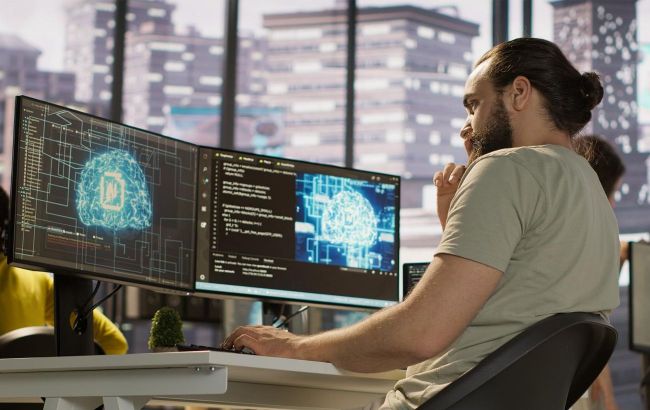4 skills that help you not to lose your job in AI era
 How to improve your skills so that AI does not replace you in the future (photo: Freepik)
How to improve your skills so that AI does not replace you in the future (photo: Freepik)
Artificial intelligence is rapidly changing the labor market, automating routine tasks and creating new challenges for professionals. However, instead of fearing job loss, it is important to adapt and develop skills that will be in demand in the future, reports The World Economic Forum.
Why human skills are more important than ever
A new Workday study titled Elevating Human Potential shows that the majority of employees (83%) believe: AI will make unique human skills even more important. Almost as many (76%) say that as the use of AI grows, they will feel an even greater need for human interaction. This indicates that our personality and skills will play a crucial role in the future.
But this future cannot be achieved alone. It requires a collaborative effort - a movement of visionary leaders who use AI for good to redefine development, unleash the potential of people, and transform industries.
Imagine a world where AI doesn't just automate tasks, but allows us to focus on developing the qualities vital to human progress: creativity, leadership, learning, and trust.
The role of AI in the development of human creativity
In today's AI-driven world, creativity is becoming one of the most valuable human skills. The survey showed that 83% of respondents believe that: AI will enhance creativity and open up new sources of economic value.
Instead of being afraid of AI as a threat to creativity, we should see it as a powerful ally. By automating routine tasks, artificial intelligence frees us up to implement ideas and unleash our creativity.
But AI does more than just save time. It can actively stimulate creativity by generating new ideas, analyzing data to uncover hidden patterns, and offering unexpected perspectives.
This dynamic connection between humans and machines is ushering in a new era of innovation, accelerating breakthroughs, and transforming entire industries.
AI unlocks leadership potential
Artificial intelligence is radically changing the approach to management and interaction between managers and teams. According to the study, the introduction of AI will shift the focus of leadership towards strategic thinking and retraining employees to work in the new reality.
By automating routine processes - from performance reviews to development plans and job descriptions - AI provides leaders with the most valuable resource: time.
Using this time, leaders will be able to focus on strategic planning and shaping the vision of the future. With the help of AI agents, they will be able to analyze trends, anticipate challenges, and optimize key business processes, freeing up space for truly meaningful work.
Instead of getting bogged down in day-to-day tasks, leaders will be able to take a broader view and inspire teams to achieve ambitious goals.
This shift to human-centered leadership, enhanced by AI, helps managers create a work culture where employees feel valued, motivated, and ready to tackle the complexities of the modern world.
AI creates a culture of continuous learning
According to the study, 81% of employees believe that AI is radically changing the skills requirements for successful work. In such circumstances, it is critical to develop a culture of continuous learning. But now it's not just about mastering new software or processes - it's about learning how to use AI effectively.
This means improving your skills, understanding how AI works, and mastering how to interact with it to solve problems and drive innovation. Today, AI platforms make the learning process more accessible than ever.
In an era of rapid technological change, those who perceive AI not only as a tool but also as a subject of study gain a key competitive advantage. Mastering artificial intelligence can be compared to learning the language of the future, which opens up new opportunities, helps bridge staffing gaps, and allows you to stay one step ahead.
Building a society of trust and responsibility
Trust is the foundation of a healthy society, but today many institutions are experiencing a crisis of confidence. But what if technology could help restore trust? It's not such a fantastic idea.
At Workday, we believe that AI can lead us into a new era of transparency and accountability, where the internal processes of organizations - from government agencies to private companies - will become more open and accessible.
And this is not just a hypothesis. A study by the World Economic Forum shows that 90% of respondents believe it: AI can significantly increase transparency and accountability. This reflects people's desire for honest and ethical institutions where decisions are made objectively and with clear motives.
How to embrace the AI-driven skills revolution
The AI-driven skills revolution has already begun. But to truly unlock its potential, we must work together to set it in the right direction. This requires collaboration between humans and machines, developing human-centered leadership, investing in training, and building trust in AI through transparency.
What steps will help us adapt to these changes
- Encourage the interaction between humans and AI by leveraging the strengths of each party and supporting creativity
- Develop human-centered leadership through skills such as empathy, creativity, and ethical decision-making
- Invest in the training and retraining of employees to meet new labor market requirements
- Build trust in AI by ensuring transparency of all processes and taking responsibility for their results.
You may be interested in:
- Scientists have proposed a new method of AI improvement

